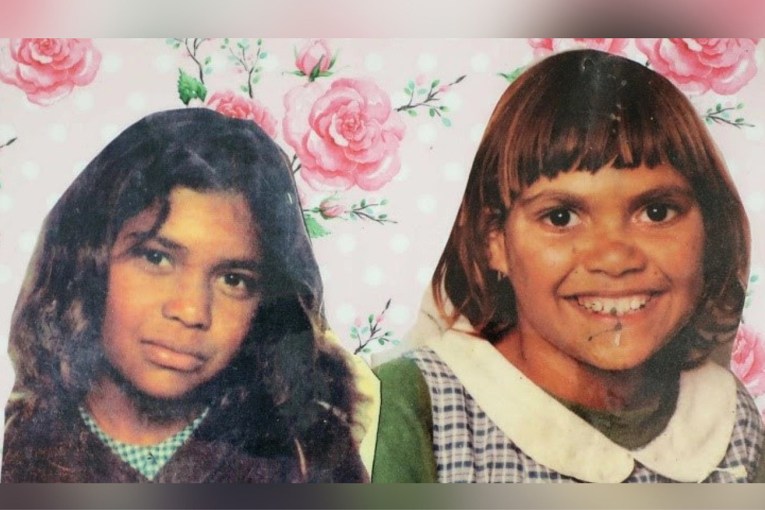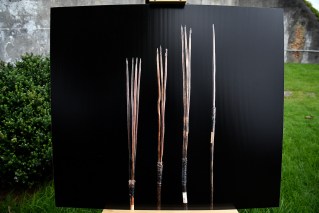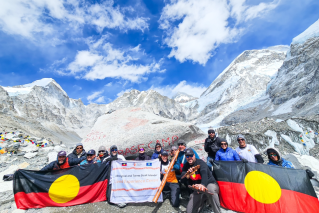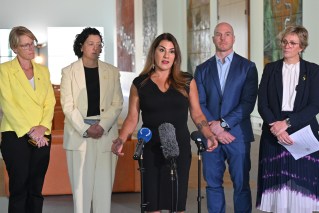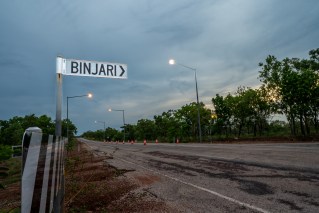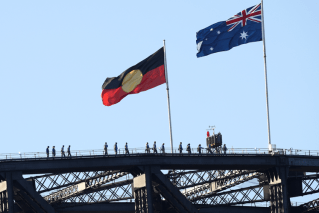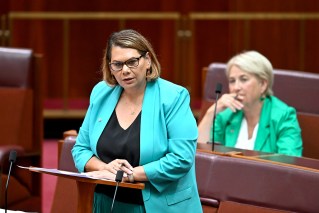Rio Tinto should pay ‘reparations’ for Juukan Gorge caves blast, inquiry recommends
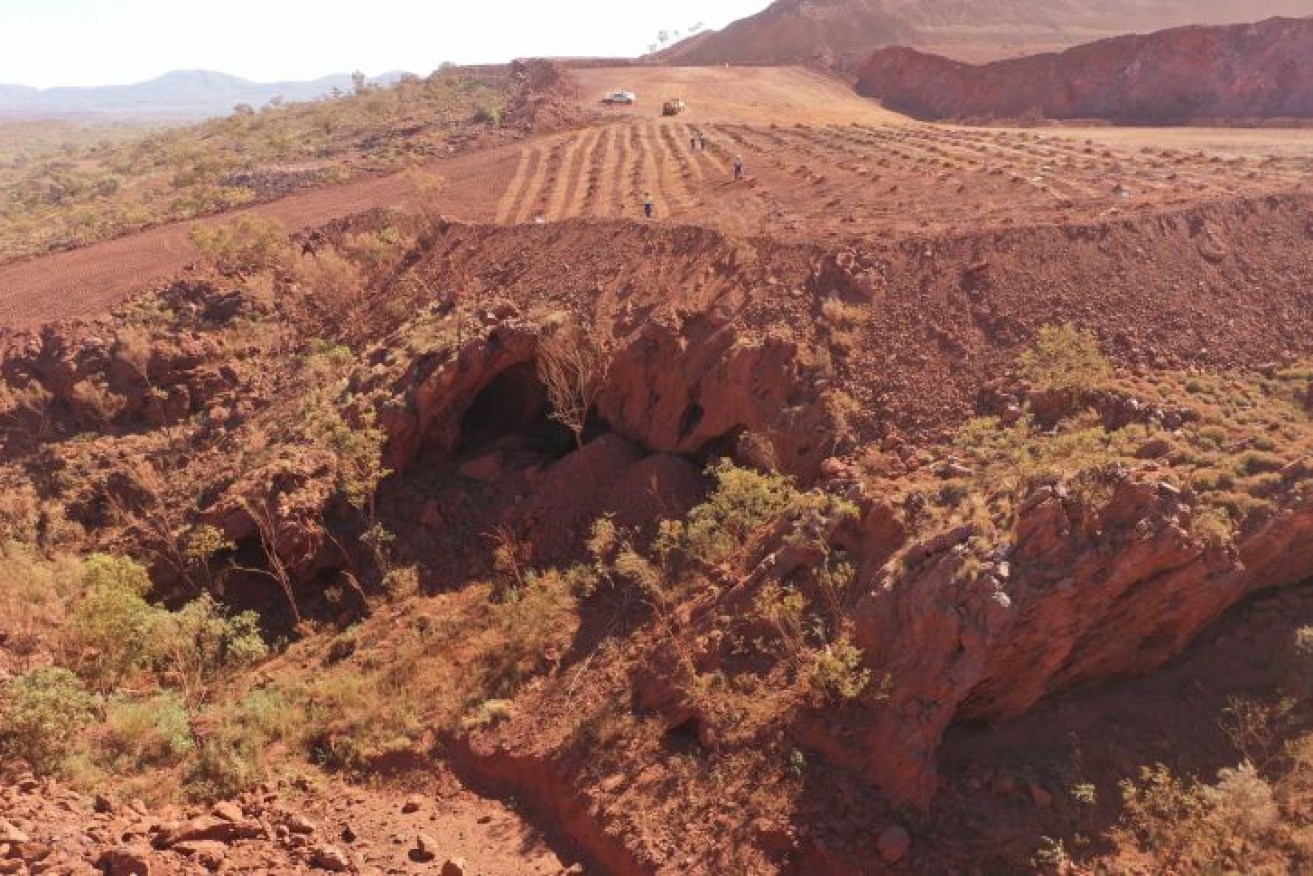
Rio Tinto was given permission to blast Juukan Gorge 1 and 2 under Section 18 of the Aboriginal Heritage Act. Photo: ABC/Puutu Kunti Kurrama And Pinikura Aboriginal Corporation
Mining giant Rio Tinto should pay compensation to traditional owners for destroying the sacred Juukan Gorge caves, a parliamentary inquiry has recommended.
Earlier this year, the company blasted the 46,000-year-old rock shelters in Western Australia’s Pilbara region, despite warnings of the site’s cultural significance.
Labor senator Pat Dodson, member of the joint parliamentary committee looking into the issue, said the destruction of the caves was one of the worst avoidable disasters “that has ever happened in our country”.
“Ancient 46,000-year-old caves of human occupation destroyed, so there is a case to be made for reparations by Rio Tinto,” he said.
The inquiry was established to investigate everything from Rio Tinto’s corporate behaviour, the adequacy of state and Commonwealth heritage laws and harm caused to traditional owners.

The destruction of the caves sparked protests outside Rio Tinto’s Perth headquarters earlier this year. Photo: ABC News/Hugh Sando
It made seven recommendations in an interim report released on Wednesday that called for actions from Rio Tinto, the West Australian government, the Commonwealth and all other mining companies.
“The [traditional owners] faced a perfect storm, with no support or protection from anywhere,” the report said.
“They were let down by Rio Tinto, the Western Australian government, the Australian government, their own lawyers [and] Native Title law.”
The inquiry recommended Rio Tinto work with traditional owners to reconstruct the ancient structure, especially an adjoining water system.
It also called for a moratorium of all mining in the area, as well as recommending the company review its internal procedures in managing Indigenous heritage matters.
Rio Tinto’s role ‘inexcusable’
Published by the Joint Standing Committee of Northern Australia, the report was titled Never Again.
“Never again can we allow the destruction, the devastation and the vandalism of cultural sites as has occurred with the Juukan Gorge – never again!” it reads.
“The blast devastated a place of personal, community, national and international significance.
“Rio Tinto’s role in this tragedy is inexcusable.
“Rio knew the value of what they were destroying but blew it up anyway.”
Elders describe the cultural loss as ‘immeasurable’
The PKKP told their side of the story to the inquiry, describing the “immeasurable cultural and spiritual loss” felt from the blast.
Their submission also described the incident as a “shocking act of corporate vandalism to our very sacred site”.
“This inquiry has elicited crucial new information and provided a fuller understanding of the circumstances of this tragedy – details that may have otherwise never come to light,” PKKP Aboriginal Corporation director Burchell Hayes said in a statement.

PKKP Aboriginal Corporation director Burchell Hayes says Rio Tinto needs to turn words into actions. Photo: ABC Pilbara/ Susan Standen
“We hope the inquiry’s preliminary findings prompt a fundamental reset of the sector, particularly in the relationships between Traditional Owners and mining companies; and pave a way forward for more equal partnerships fostered by greater respect and mutual benefit.
“We have started the long road to healing and repairing our relationship with Rio Tinto, but there is still a long way to go.
“We remain steadfast in our conviction that a tragedy like this should never happen again; and that Rio Tinto now needs to turn its words into actions.”
PKKP told the inquiry there was a major power imbalance when negotiating with mining companies.
Rio Tinto should remove legal gag clauses that stop landowners from speaking publicly about their deals and negotiations, the report recommended.
This report is the latest in the months-long fallout from the blasting, already the company has felt public and shareholder backlash.
The company has already issued a public apology and three senior Rio Tinto executives have stood down due to the incident.
Miner ‘working to progress a remedy’
In a statement, Rio Tinto said it welcomed the opportunity to participate in the committee’s inquiry and would review the recommendations in the coming days.

Rio Tinto says it is “committed to learning” from what happened at Juukan Gorge. Photo: ABC News/Hugh Sando
Rio Tinto chairman Simon Thompson said the company recognised the destruction of the Juukan rockshelters caused significant pain to the Puutu Kunti Kurrama and Pinikura people (PKKP).
“We are working very hard to progress a remedy with them,” he said.
“As a business, we are committed to learning from this event to ensure the destruction of heritage sites of such exceptional archaeological and cultural significance never occurs again.
“We have made important changes to the way we manage cultural heritage sites and our relationships with Traditional Owners, including a commitment to modernise our agreements.
“We recognise the importance of ensuring relationships with Traditional Owners are built on partnerships based on mutual benefit, respect and trust.”
WA legislation ‘woefully out of date’
The destruction of the caves by Rio Tinto was technically legal, as the company received permission to conduct the blasts in 2013 under Section 18 of the WA Aboriginal Heritage Act.
The inquiry is investigating the adequacy of state and Commonwealth heritage protection laws and the way they interact.
“The Western Australian legislation that enabled the destruction of Juukan Gorge is woefully out of date and poorly administered. Everyone accepts this,” the report said.
“We are suggesting they seriously look at … these Section 18 notices, which enables a company to just do what they wish” Mr Dodson said.
“It’s a license to destroy sites.”
The WA government is currently reviewing these laws, which were written decades before Native Title was introduced.
In a statement, WA Indigenous Affairs Minister Ben Wyatt welcomed the interim report but poured cold water on one of the recommendations, calling for a moratorium on new Section 18 applications.
“I have always been of the view that a moratorium on new Section 18 applications is not a practical solution in light of their use across a vast array of different projects, most of which are uncontentious,” he said.
“As Minister I won’t be considering applications for Section 18s where native title parties have not been appropriately consulted.
“Section 18 approvals are required for many non-mining activities including housing, road and bridge construction. Recent applications have included a waterbird sanctuary and a holiday park.”

WA Indigenous Affairs Minister Ben Wyatt says a moratorium on Section 18 applications is not practical. Photo: ABC News/David Weber
Mr Wyatt said the WA government was moving towards the “historic reform of Western Australia’s outdated Aboriginal heritage laws”.
“The new laws put Aboriginal people at the heart of decision-making about their heritage,” he said.
The committee’s final report is expected to be handed down next year and will further examine the legal regimes in all states and territories, as well as making calls for sweeping reforms.
“The destruction of Juukan Gorge also highlighted the shortcomings of federal law,” the report said.
“Ironically, Native Title has become another means to destroy Indigenous heritage.”
None of the committee’s findings are legally binding, and it will be at the discretion of governments and companies to respond accordingly.
